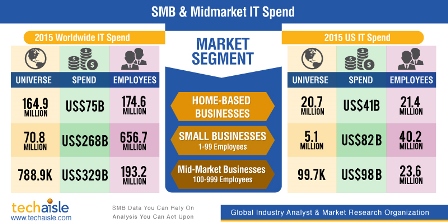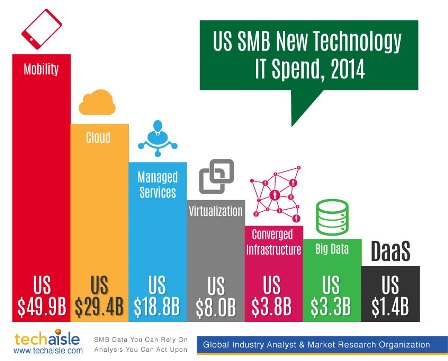As uncertainty swirls around both the IT infrastructure needs of the SMB market and the channel that supplies these solutions, Dell’s channel team, led by Greg Davis and Bob Skelley, could not be more upbeat. And as Techaisle research shows, channel members of Dell’s PartnerDirect program continue to power on.
In a recent
Techaisle study of channel partners selling Cloud, Mobility, Managed Services, Virtualization and Datacenter solutions to SMBs, 58 percent said that Dell is a trusted brand with 48 percent mentioning that Dell is a reputable brand. With today’s announcement on software competencies, Dell is looking to build on that presence with an expanded portfolio addressing essential (and high-growth) infrastructure software products.
Partner Voice
It is clear that Dell considers sales enablement and execution to be the keys to its channel success. The company exhibits very tight focus on issues like deal registrations and training. In qualitative interviews, Dell’s partners say that Dell is easy to work with. They report that Dell’s partner program is straightforward, with a low threshold to enter, reasonable certifications’ requirements and all training materials available online. Dell partner executive Marcus Lindqvist, Country Manager for Sweden’s
Dustin AB highlighted the benefit of this approach when he shared with us his reasons for being upbeat on Dell: “deal registration, robust process that protects the partner investment in our engagement with Dell on a deal by deal basis. We register the deal at an early stage in the sales process, most deal registrations are approved, and from that point we are in the lead without any future discussions about other partners or Dell direct sales undercutting our work. Deal registration is done online with quick turnaround times.”
Echoing the sentiments, Daniel Serpico, President of
FusionStorm, [partner of Dell] noted, “[there is] very real clarity around deal registration and partnering; there is significant value creation around integration and configuration and Dell has infused software and tools to win with Dell.”
Software Competencies
It was only a matter of time before Dell extended the PartnerDirect program beyond its roots, from enabling and incentivizing hardware sales to rolling out software competencies. Over the past year, with numerous acquisitions and the hiring of John Swainson to helm Dell’s software operation, Dell has launched an aggressive strategy to build scalable enterprise software offerings into its solution portfolio, with emphasis in the areas of datacenter and cloud management, information management, mobile workforce management, and security and data protection.
On September 3, Dell announced four new PartnerDirect software competencies, including:
- Security: Includes identity and access management, as well as network, endpoint and email security
- Systems Management: Includes client management, performance monitoring, Windows Server management, virtualization and cloud
- Data Protection: Includes enterprise backup/recovery, virtual protection, application protection and disaster recovery]
- Information Management: Includes database management, business intelligence/analytics, applications and data integration, and big data analytics
Dell partners now have the flexibility to decide between reselling hardware only, software only (via resale or a referral fee program) or both hardware and software. As per Techaisle’s
Marketview, worldwide SMB (1-999 employees) spend in 2016 for the above four competences will be US$11.1 billion. Combine it with traditional datacenter solutions that includes servers, storage, networking the market spend jumps to over US$40 billion by 2016. This is a huge opportunity indeed for Dell and its channel partners.
Best-of-breed Solutions
The latest
Techaisle channel partner study found that 54 percent of channel partners prefer to offer best-of-breed solutions to their SMB customers, with 28 percent preferring single vendor solutions. The key to successfully addressing both preferences is to combine best of breed offerings under a single brand, allowing partners to also take advantage of integration and volume benefits. HP and IBM have been active in staking out this territory; with the September 3 announcement, Dell has signaled its intention to compete aggressively for leadership within the small and mid-market business market segment.

In the cloud infrastructure area, Dell’s partner program rests on three pillars - Cloud Builder, Cloud Provider and Cloud Enabler. For all three pillars, best-of-breed solutions take on an entirely different meaning as shown in another study recently conducted by Techaisle. The study was done to understand the
Winning Strategies of Successful and Profitable SMB Channel partners selling cloud.

The study revealed that channel partners that are comfortable and profitable with cloud solutions combine best-of-breed solutions and wrap them tightly under their own offerings & services. These channels have also begun to utilize reference architectures from their vendor partners.
Training as the Lead-in
Channel partners prefer to partner with IT vendors that have quality products and innovative technology solutions that solve SMB pain points. This presents a complex challenge to vendors like Dell: partners need suppliers to both address customer requirements (with innovative, reasonably-priced and easily-deployed technology that addresses SMB pain points) and partner business requirements, such as training, pre-and-post sales support, and lead generation. As the results of Techaisle’s research demonstrate, product training is particularly important in this context. Dell is clearly cognizant of this demand: Marvin Blough, executive director of Worldwide Channels and Alliances for Dell Software is on record as observing that “Trained partners sell four times more than their untrained counterparts,” and Dell is said to be on plan to deliver over 250,000 training sessions this year.
Techaisle has observed, however, that most vendor training focuses on product attributes, and does not address development of the skills (building and advising on infrastructure strategy and workload roadmaps, establishing effective sales tactics and compensation models, developing the services competencies needed by customers) required for VARs to migrate successfully to advising on and deploying hybrid infrastructure. These advanced management-level training offerings will be essential for vendor differentiation, especially for the complex hardware/software solutions that are at the core of Dell’s evolving strategy.

Concluding Remarks
Clearly, building leadership in the SMB infrastructure market is an ongoing challenge: requirements continue to evolve, entrenched vendors have strengths and relationships that have developed over many years, and Techaisle’s research has found that trusted brand figures for Dell are lower than for some of its competitors. Its brand equity score (BES) among channel partners is also lower than its competitors. It seems clear, though, that Dell is aware of market requirements and willing to invest in its SMB market and channel success, rolling out training modules, integrating partners acquired through acquisitions and combining both hardware and software for end-to-end solution delivery.
Michael O’Neil, Consulting Analyst with Techaisle, notes that “Infrastructure delivery has become a very challenging issue for business partners. Hardware-only sellers are at a significant disadvantage in a market where buyers are looking for hybrid solutions involving both on-premise and cloud-based platforms that combine server, storage and networking hardware with system management and security software to build solutions that will seamlessly support application delivery, data protection and backup, and many other key operational objectives. By offering a wide range of product types, and focusing on making the selling motion as clean as possible, Dell is enabling partners to focus on customer requirements rather than product silos.”
Looking at Dell’s approach from a partner’s perspective, Daniel Serpico provided an apt summary: “Dell sales teams cover all markets, which allows us as a partner to be able to have discussions with the Dell account manager on a specific account or deal, giving us a counterpart that understand the end-customers actual requirements and needs. Both teams have a laser sharp focus on the customer and to jointly win the deal [supported by] shorter turnaround and quick responses from Dell.”





















 Small and Mid-Market firms will invest over a quarter trillion dollars in Datacenter Technology in the period between 2012 and 2016, according to the most recent report from Techaisle. Datacenter segments include Servers, Networking including Security Appliances and Storage solutions. We can also begin to add Virtualization within the context of data center as virtualized data centers are becoming front-and-center. As seen in this bubble chart, the nine key segments include each of the three product categories in the three largest regional markets, North America, Asia Pacific and Western Europe. As we have shown in recent reporting, the rise of China continues to offer some of the most interesting market opportunities for vendors marketing to SMBs; the Asia/Pacific Storage Market being is the latest example, with combined spending over the forecast of $16B alone at a CAGR of over 22%. This is followed by the Asia/Pacific Networking Market, which is expected to reach $24B at a 14% rate. Although not growing as fast at 7%, the Asia/Pac Server Segment is expected to reach ~$17B. Other important points include:
Small and Mid-Market firms will invest over a quarter trillion dollars in Datacenter Technology in the period between 2012 and 2016, according to the most recent report from Techaisle. Datacenter segments include Servers, Networking including Security Appliances and Storage solutions. We can also begin to add Virtualization within the context of data center as virtualized data centers are becoming front-and-center. As seen in this bubble chart, the nine key segments include each of the three product categories in the three largest regional markets, North America, Asia Pacific and Western Europe. As we have shown in recent reporting, the rise of China continues to offer some of the most interesting market opportunities for vendors marketing to SMBs; the Asia/Pacific Storage Market being is the latest example, with combined spending over the forecast of $16B alone at a CAGR of over 22%. This is followed by the Asia/Pacific Networking Market, which is expected to reach $24B at a 14% rate. Although not growing as fast at 7%, the Asia/Pac Server Segment is expected to reach ~$17B. Other important points include:

 Eastern Europe is expected to develop into a ~$1B market over the forecast period as is Latin America, both growing rapidly from a relatively small base. And as has historically been the case, Africa and the Middle East continue to lag with a very small share of both volume and growth.
Eastern Europe is expected to develop into a ~$1B market over the forecast period as is Latin America, both growing rapidly from a relatively small base. And as has historically been the case, Africa and the Middle East continue to lag with a very small share of both volume and growth. With a week before finals in Organic Chemistry and a major paper due after Thanksgiving break, my daughter needed some freeware called
With a week before finals in Organic Chemistry and a major paper due after Thanksgiving break, my daughter needed some freeware called